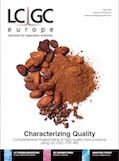Metabolomics 2019
Metabolomics 2019, the Jubilee 15th International Conference of the Metabolomics Society, will be held in The Hague, The Netherlands, from 23–27 June 2019. The conference will be held at the World Forum Conference Centre, located in the Hague, and an hour from Schiphol Airport and Rotterdam The Hague Airport.
Image credit:Photocreo Bednarek/stock.adobe.com/

Metabolomics 2019, the Jubilee 15th International Conference of the Metabolomics Society, will be held in The Hague, The Netherlands, from 23–27 June 2019. The conference will be held at the World Forum Conference Centre, located in the Hague, and an hour from Schiphol Airport and Rotterdam The Hague Airport. The Netherlands has a strong academic and industrial tradition in metabolomics. To ensure this year’s conference is a major success, the Metabolomics Society will work with other European metabolomics associations to highlight the applications of metabolomics in industry and biological research.
The main conference days will include four parallel tracks, one exclusively on biomedical applications, one exclusively on plant, food, environmental, and microbial applications, and one on technology. In the technology track, new analytical methods and technologies will be discussed; one hot topic this year is metabolite identification. The fourth track is a new addition and will focus on new frontiers. This track will include presentations highlighting new developments that may impact the field of metabolomics, such as regulatory aspects, novel technologies, including artificial intelligence, deep learning, and single-cell metabolomics, and novel applications, such as stem cells, organoids, and organ-on-chips. In addition, attendees can expect to hear about many exciting applications of metabolomics in the field of biomedical and clinical applications, including the gut microbiome, and nutrition and plant research.
There will be 18 pre-conference workshops on Sunday afternoon and Monday before the conference starts, covering all aspects and application areas of metabolomic research, which will be of great educational value for early career scientists and students.
Another novel segment of this year’s conference is two day-long workshops on data acquisition (Sunday) and data (pre-)processing and biostatistics (Monday) for newcomers to the field.
Sunday evening will also feature another new element: career night. This is the ideal opportunity for early career researchers to prepare for the next career step by meeting research groups, research organizations, and companies with job openings. In addition, round table discussions on career-related topics ranging from networking to work-life balance will be organized.
Before the conference two (independent) satellite meetings will be organized: on Saturday 22 June “Metabolomics and Epidemiology” and on Sunday morning “Metabolomics Enabling Tools for Large Studies and Biobank Initiatives”.
The conference is the official meeting of the Metabolomics Society, and the largest metabolomics meeting worldwide. The Metabolomics Society expects this event to attract metabolomics researchers from around the world, with an anticipated 1000–1200 visitors, and over 800 registrations already received. As an added bonus to registrants, the conference dinner, which is being held at a beach club, is included in the registration fee.
The conference will also have exceptionally good exhibitor opportunities with an “all on one floor” concept featured in the conference layout; all meeting rooms and exhibitor space are on one floor, thereby providing optimal flow of visitors to the exhibitor booths.
The organizers look forward to welcoming you to The Hague this June.
E-mail:info@metabolomics2019.org Website:www.metabolomics2019.org

Silvia Radenkovic on Her Research and Passion for Scientific Collaboration
April 3rd 2025Radenkovic is a PhD candidate at KU Leuven and a member of FeMS. Her research focuses on inborn metabolic disorders (IMD), like congenital disorders of glycosylation (CDG), omics techniques such as tracer metabolomics, and different disease models.
Evaluating Natural Preservatives for Meat Products with Gas and Liquid Chromatography
April 1st 2025A study in Food Science & Nutrition evaluated the antioxidant and preservative effects of Epilobium angustifolium extract on beef burgers, finding that the extract influenced physicochemical properties, color stability, and lipid oxidation, with higher concentrations showing a prooxidant effect.










